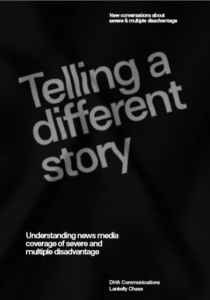Understanding news media coverage of severe and multiple disadvantage (SMD)
 Telling a Different Story is a research inquiry conducted between January 2018 to March 2019. It explores how print and online news media report on severe and multiple disadvantage (SMD). In this report, SMD refers to the interlocking nature of multiple disadvantages such as extreme poverty, homelessness, discrimination, mental ill health, substance misuse, violence and abuse and contact with the criminal justice system. (Reasearch enquiry by DHA Communications/Lankelly Chase)
Telling a Different Story is a research inquiry conducted between January 2018 to March 2019. It explores how print and online news media report on severe and multiple disadvantage (SMD). In this report, SMD refers to the interlocking nature of multiple disadvantages such as extreme poverty, homelessness, discrimination, mental ill health, substance misuse, violence and abuse and contact with the criminal justice system. (Reasearch enquiry by DHA Communications/Lankelly Chase)
This research reveals how news media coverage currently rarely contributes to a positive understanding of multiple disadvantage.
The research process focused on several variations on search terms broadly connected to multiple disadvantage including children (facing SMD); criminal justice; drug and alcohol; extreme poverty; homelessness; mental health; violence and abuse.
The process included:
- The establishment of a steering group made up of people from across the third sector including people with lived experience of SMD
- Interviews with leading journalism academics and journalists working across print, broadcast and online platforms
- Quantitative analysis of more than 8,000 online news articles gathered over a three-month period from the BBC Online, Buzzfeed, Daily Mail, Daily Telegraph, The Guardian and Vice
- Tonal analysis of articles
- Qualitative and discourse analysis of articles
- A two-week contemporary research period to understand broader media construction of articles referencing disadvantage
- An exploration of findings emerging from the two-week study
“Simple stories confirm people’s beliefs – ‘they are not like us.”
Steering group member
“We in the media can do more by highlighting lives that people lead rather than the lives that we think they lead. If you give a more accurate representation, then others will feel more willing to come forward.”
Journalist
“We find the world scary so we seek explanations for why it is scary. Explanations based on complexity are difficult for mass media so they provide us with simple explanations which are typically: ‘Who is to blame, whose fault is it that the world is so crazy?”
Steering group member
“We turn the people we report on into victims which deprives them of any agency in a situation. How do you report poverty without making the poor look pathetic? It is not a problem with an easy solution.”
Journalist.
“Sometimes you read something and you are just happy that isn’t you… so there is a certain thing which is ‘shameful joy’ which brings you comfort… and that is quite relevant.”
Steering group member
“There needs to be closer connection between the community and reporters and news outlets and more trusting and understanding.”
Journalist
“Charities don’t ‘get’ newsworthiness, and, also, news might not be what they want covered.”
Steering group member
“Some media outlets don’t want to create different stories.”
Steering group member
“Is ‘severe and multiple disadvantage’ too hard for us all to live with?”
Steering group member
“There is a big question for me about what we expect journalists to do. We now expect them to be educating the public and get behind our view of the world. How realistic is this?”
Steering group member
This study also reveals several opportunities that encourage us all to challenge and change this situation. The following recommendations provide a starting point for this journey.
RECOMMENDATION 1. Develop a shared understanding
The charity and media sector including content providers need to adapt working styles. There needs to be more collaboration, openness and a shared understanding of both the problems and also the opportunities created by embracing change. One way of doing this is by having new conversations about telling a different story of severe and multiple disadvantage.RECOMMENDATION 2. Create spaces to cultivate relationships
There is already significant experience and examples of some people in the charity and media sectors working closely together. This expertise should be pooled to form the basis of a coordinated programme of events and other initiatives which deepen relationships and nurture trust between the charity sector, people with lived experience, all journalists and media outlets.RECOMMENDATION 3. Construct shared narratives that include root causes
Charities could develop, agree and implement shared narratives which reflect the root causes as to why people face multiple forms of disadvantage without detracting from any organisational focus. This could go further and involve shared campaigns which actively promote a more extensive understanding of severe and multiple forms of disadvantage.RECOMMENDATION 4. Support best practice in journalism training
The charity sector should collaborate with, and support, Higher Education Institute media courses. This could encourage student journalists to look at the ethics of journalism, promote positive storytelling, systemic narratives and acknowledge the need of providing media space for people with lived experience to tell their own stories in their own voice. Part of this work could involve local media organisations and journalists entering the profession.RECOMMENDATION 5. Develop a programme of support for charity communications professionals
Charity marketing and communications teams need more practical support. This support could be delivered through a combination of bespoke training courses developed in tandem with a suite of simple online toolkits. Content could include how to place multiplicity at the heart of stories; systemic narratives and strategic communications; writing compelling case studies; creating content in different forms; relationship building between journalists and people with lived experience; agile responses to emerging policies; the use of data including FOI requests.
Please follow the link or click the image to view and download the full report (printer friendly version)

With thanks to Lankelly Chase/DHA Communications for delivering this report inquiry and for creating opportunities for further conversations regarding media and representation.
Thanks as ever for your continued support.